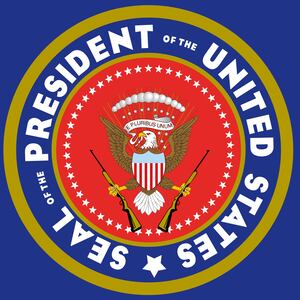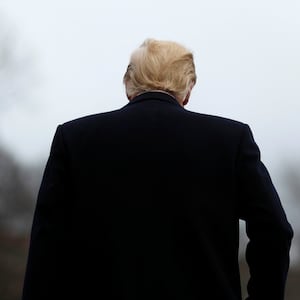White House officials were left aggrieved this week after what they saw as a rushed attempt by the National Rifle Association to flex its muscle—and box in the president—during the current debate over gun control reform.
The frustration stemmed from a Tuesday phone call held between Donald Trump and longtime NRA chief executive Wayne LaPierre. According to early reports, Trump had given LaPierre assurances that he would not be supporting efforts to pass universal background checks legislation. Behind closed doors, White House officials were caught off guard by those early characterizations which—according to three administration officials and a source close to the president—they continue to privately blame on the NRA.
“[In the White House], it was widely seen as a dick move,” one of these officials, who deals regularly with advocacy organizations and gun-lobby envoys, said.
A senior White House official insisted to The Daily Beast on Tuesday night that “the call [between Trump and LaPierre] occurred” but quibbled with the technicalities of what the president did, or didn’t, reportedly take off the table. “The president has not mentioned supporting universal background checks,” the official said. “Meaningful background checks remain on the table.”
As of Friday afternoon, neither Trump nor his senior staff had defined what “meaningful” checks would even entail. But the general consensus in the West Wing was that the NRA, currently embroiled in legal and internal strife, wanted to boost the public perception that it still exerts influence over Trump and the Republican Party, and that it was playing a game of semantics in order to do so.
Trump, who has famously revolted against narratives of being controlled by advisers or outside forces—to the point that he’s temporarily upturned his own administration’s ambitions—has taken notice. Since Tuesday, the president has told some of those close to him that he believes the NRA is trying to show how strong they continue to be, and are playing games with the White House, said a senior administration official who has discussed this with Trump. The official said that the president mentioned this sounding “mild[ly] annoyed,” but did not hear Trump order anything to be done about it.
A spokesperson for the NRA declined to comment citing a “longstanding policy of not discussing the content of private meetings.” The White House did not provide comment as of press time.
The grievances that have sprouted in the wake of the Trump-LaPierre call are just the latest illustration of an increasingly tense relationship between the gun rights lobby and the president that it spent millions of dollars in resources to support. Trump has taken note of the NRA’s current financial struggles, internal turmoil and even criticized its outside counsel. And in the wake of dual mass shootings—one in El Paso, Texas, the other in Dayton, Ohio—he has flirted with the idea of crossing the group in pursuit of more progressive gun control measures.
Trump made similar overtures and demands after past instances of high-profile gun violence—even taunting a Republican lawmaker for being too “afraid” to take on the NRA after the Parkland school massacre last year— only to eventually back away from major legislative reforms. And when reports surfaced that he had given LaPierre assurances that he would not push for universal background checks, it was widely assumed that he was following that familiar pattern. Top Democrats on Capitol Hill predict he still will.
But what stood out about this past week, according to several Democratic congressional offices, was how administration officials moved to urge caution about over-interpreting reports of the LaPierre call.
On Wednesday, Trump said he had made no commitment to LaPierre while still parroting the NRA line that any gun control legislation represents a “slippery slope” to more reforms. Additionally, White House staff held a call with Hill officials to stress that they had not backed away from negotiations.
One source familiar with the discussions told The Daily Beast that the staff gave explicit assurance that the words “universal background checks” did not come up on the LaPierre call. While “universal” background checks are an objective championed by House Democrats, “expanded” background checks are the goal of the most prominent Senate bill: legislation authored by Sens. Pat Toomey (R-PA) and Joe Manchin (D-WV) that would extend such screenings to private sales such as those that take place at gun shows.
“I’m sure Trump said something to give [LaPierre] the impression everything was cool,” the source said. “But, in general, they felt that the call was not represented accurately in the press. They felt the NRA went out and misrepresented it.”
Despite attempts by the administration to clean up confusion, few people expect major legislation to ultimately result from ongoing talks. Senator Chris Murphy (D-CT), a leading gun control advocate, told reporters on Friday that he put the odds of legislation passing below 50 percent. He also said that extreme risk protection orders (otherwise known as “red flag laws”) were more likely to be the legislative end product than anything dealing with background checks.
But Murphy, who has been in talks with the White House since the LaPierre call, also said that Trump not only hadn’t abandoned negotiations but understood he would ultimately have to break with the NRA for legislation to happen—should he decide he wanted it to.
“The president and the White House has made it clear that they are open to leading on this issue and trying to bring Republicans along with them,” the Senator said. “I believe the White House is still committed to try and work on a comprehensive anti-gun violence proposal that will include strengthening background checks."







